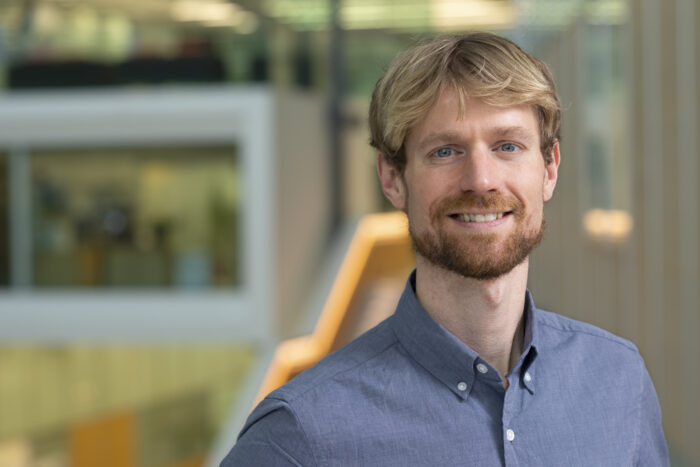
The LMB is delighted to announce the appointment of Wes Robertson as the newest Group Leader in our PNAC Division, where he will develop genome engineering tools for the de novo synthesis of non-model gut bacteria, with the ultimate aim of reprogramming the microbiome.
Wes commented, “The LMB is a world-class institute for synthetic biology. I’m honoured and excited to join the PNAC division, where I look forward to pursuing synthetic genomics research to advance the fields of bacterial genome design and total synthesis.”
Synthetic biology enables researchers to program the activity of bacteria by manipulating their DNA, the key genetic component of the cell which serves as the blueprint for life. For example, engineering pieces of DNA that are introduced into bacteria has enabled the use of bacteria such as E. coli to produce useful medicines such as insulin.
Wes’ research aims to improve synthetic DNA design and engineering technologies for non-model bacteria, where a better understanding of total genome syntheses will allow synthetic biologists to endow cells with novel activities not found in nature. To this end, while a postdoc in PNAC he has previously made seminal contributions to the field of synthetic genomics, pioneering approaches for the synthesis of genomes from scratch as well as their redesign to unlock innovative properties useful in biotechnology and medicine. With a team of genome engineers, they accomplished this in the model bacteria E. coli, with the redesign of the genetic code at a genome-wide level enabling two emergent properties: viral resistance and unnatural polymer synthesis.
Now, Wes aims to extend this paradigm beyond model bacteria, applying these principles to bacteria which significantly affect human health. His group will develop synthetic genomics tools to synthesise gut bacteria, with the aim of reprogramming the microbiome to better understand and potentially modulate health. The introduction of orthogonal genetic codes to native bacteria provides the opportunity to improve their genetic stability and ultimately enable their future use as programmable biotherapeutics to sense and respond to diseases.
After receiving a BA (Hons) in Molecular and Cellular Biology from Vanderbilt University in Nashville, Tennessee (United States), Wes carried out his Ph.D. research at Yale University. Following this, he joined the LMB as a postdoctoral scientist in October 2017. For the past six years he has been reengineering the genetic code of the model bacteria E. coli to enable emergent applications in synthetic biology.